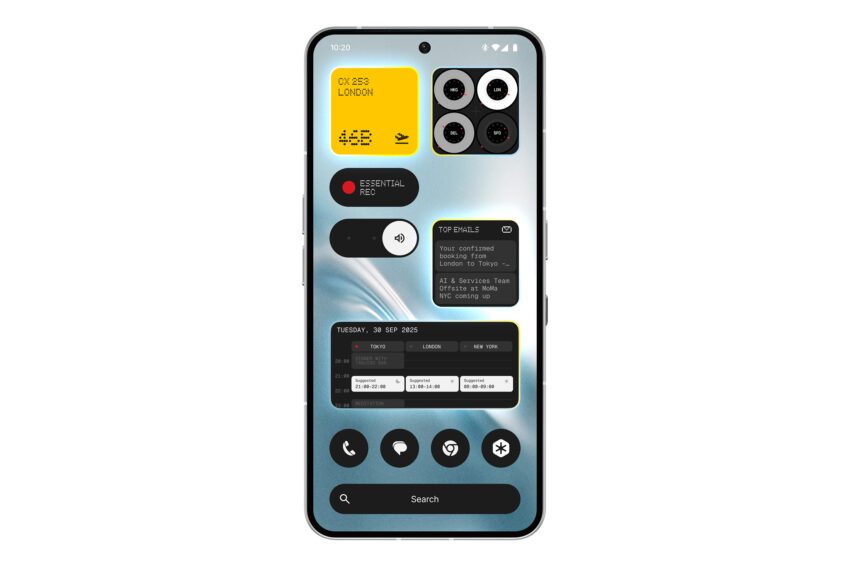
nothing s first step to an ai Nothing has introduced Playground, a tool that allows users to design smartphone apps using artificial intelligence, marking a significant yet somewhat misleading claim about the company’s vision for an AI-native operating system.
nothing s first step to an ai
Understanding Playground and Its Implications
Nothing’s announcement of Playground comes with the bold assertion that this marks “the first step towards an AI-native operating system.” However, this characterization is somewhat misleading. Playground is essentially an app store filled with user-designed, AI-generated applications, and it is built on the existing Android platform. While it may not be a revolutionary operating system, the concept is intriguing and offers a glimpse into a future where smartphones could become more personal and adaptable.
The Vision Behind Essential
The foundation of this initiative is encapsulated in the launch of Essential, a term Nothing uses to describe its suite of AI-related products. According to Carl Pei, the founder and CEO of Nothing, Essential aims to create a world “where devices adapt to people, not the other way around.” This vision suggests a shift in how technology interacts with users, moving toward a more intuitive and personalized experience.
Despite the hype surrounding the launch of Essential, it is important to note that several products under this umbrella are already available. These include an AI search tool and Essential Space, which organizes voice notes and images. Thus, while the announcement may seem like a fresh start, it is actually building upon existing technologies.
Introducing Playground and Essential Apps
Playground is the centerpiece of this initiative. It functions as Nothing’s version of an app store, populated with applications designed using Essential Apps, an AI-powered tool that allows users to create simple applications based on written prompts. This feature empowers users to tailor apps to their specific needs, fostering a sense of ownership and creativity.
Potential Applications
Some examples of the types of applications users might create include:
- A mood tracker that syncs with a music playlist.
- A pipeline that converts receipts into expense forms.
- An app that suggests outfits based on wardrobe selections and upcoming appointments.
These examples illustrate the potential for personalization that Playground offers, allowing users to design tools that fit seamlessly into their lives.
Current Limitations and Future Aspirations
While Playground is an exciting development, it is still in its early stages. Currently, users can only design widgets, which limits the functionality of the applications they can create. Additionally, the app creation process must occur on a web platform using written inputs. Once created, users can install these apps on their own devices or share them on Playground for others to download. However, this feature is exclusive to Nothing phones, with the exception of the Phone 1, which Pei notes is no longer receiving major updates and thus cannot support the new apps.
Pei envisions a future where the app creation process becomes “more and more seamless,” potentially allowing users to create applications directly on their phones, possibly even through voice commands. This evolution could lead to more sophisticated applications that occupy the entire screen, akin to the standard apps currently available on smartphones.
Building a Creator Economy
Another intriguing aspect of Playground is its potential to foster a new creator economy. Users can take existing apps and remix them, evolving applications in a manner similar to the open-source community. Pei has expressed a desire to create a platform that encourages collaboration and innovation among users, which could lead to a diverse range of applications tailored to various needs.
Despite this ambitious vision, Pei has indicated that monetization is not a primary focus at this stage. He believes that the platform needs to reach a certain level of scale before considering any business models. He cites YouTube as a potential example of how the creator economy could develop within Playground, suggesting that as the platform grows, monetization opportunities may naturally arise.
The AI-Native Operating System Concept
Pei’s vision for an AI-native operating system extends beyond just app creation. He imagines a future where smartphones could proactively adjust app placements or suggest applications based on user behavior. However, it is crucial to clarify that Playground and Essential do not constitute a new operating system; they are more accurately described as an interface layered on top of Android.
Pei acknowledges this distinction, noting that the term “OS” can be interpreted in various ways. He emphasizes that Nothing has no intention of abandoning Google’s Android platform, which serves as the foundation for its products. “We’re not touching the lower level code,” he states, reinforcing the idea that Android remains a robust platform with a rich developer ecosystem. Users will still need to download popular applications like Instagram or TikTok when setting up their devices, underscoring the ongoing reliance on existing app ecosystems.
The Future of Smartphones
While Playground presents an exciting new feature and the potential for a creator economy, it is essential to recognize that Nothing has a long way to go before it can operate independently of established platforms. Unlike other hyped AI-powered gadgets, such as Rabbit’s R1 or OpenAI’s collaboration with former Apple designer Jony Ive, Pei is not suggesting an imminent departure from traditional smartphones. When asked about the future of apps, he candidly states, “When am I ready to say goodbye to apps? You know, not anytime soon.”
Conclusion: A Step Toward Personalization
In summary, Nothing’s Playground tool and the accompanying Essential Apps represent an intriguing development in the realm of smartphone technology. While the claims surrounding an AI-native operating system may be overstated, the initiative does offer a glimpse into a future where smartphones could become more personalized and adaptable to individual user needs. As the platform evolves, it has the potential to foster a new creator economy and redefine how users interact with their devices.
However, it is essential to temper expectations and recognize the current limitations of Playground. As it stands, the initiative is built on the existing Android framework, and its success will depend on user adoption and the ability to create a vibrant ecosystem of applications. The journey toward a truly AI-native experience is still in its infancy, but the vision articulated by Pei is undoubtedly an exciting one.
Source: Original report
Was this helpful?
Last Modified: September 30, 2025 at 5:36 pm
0 views














